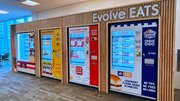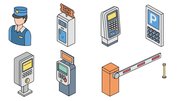Article
Kiosk makers show they can integrate into retail
At Chicago's Retail Systems 2001 trade show, a handful of kiosk companies showed that kiosks belong in stores.
March 24, 2004
CHICAGO - At Retail Systems 2001, kiosk exhibitors represent only a handful of the trade show's nearly 350 exhibitors. The key for many exhibitors was presenting applications that could integrate into already existing processes set up in retail stores.
Attendance at the exhibit floor was steady but light yesterday; registered attendees, estimated by conference organizer MoonWatch Media at 5,000 last week, may have been busy with conference sessions.
Or perhaps the lure of the real economy, as MoonWatch dubbed this year's conference theme, couldn't compete with the lure of what was known until recently as the new economy, before the wreckage of dot-coms made the new economy sound like Soviet Union-era hype.
Hamed Shahbazi, chairman and chief executive officer of Info Touch Technologies, was one of many who thought the turnout was light.
Despite the lack of crowds, kiosk exhibitors were optimistic that their presence on the floor could help widen their presence in retail during the four-day show, which runs Monday through Thursday.
"Here's what I hope I can tell you on Thursday. The turnout wasn't what I expected, but we were able to link up with people who are looking to deploy meaningful projects," Shahbazi
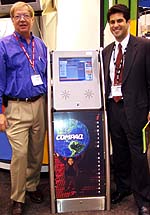 |
Compaq's Steve Bellinghausen (left) and Hamed Shahbazi show off a Surfnet powered public access Internet kiosk run on Compaq hardware. |
Info Touch was exhibiting at the Compaq Computer Corp. booth, demonstrating its Surfnet software, which turned a Compaq kiosk into a public access Internet kiosk. Shahbazi also used the conference venue to announce a strategic alliance with Clarinet Systems. Clarinet's wireless technology makes it possible to download e-mail from a public Internet kiosk to a user's personal digital assistant. Info Touch and Clarinet will test wireless kiosks this fall.
Sharing is the key
Netkey Inc., which makes of a suite of software for designing kiosk applications and managing the machines, was invited by IBM Corp. and software company Found Inc. to display at IBM's booth. At the show, Netkey announced a partnership with Found, which makes database software called Integrated Clicks and Mortar (ICaM).
Gregory Decker, Netkey's business consultant, said that the ICaM database middleware integrates with a retailer's other systems such as point of sale, e-commerce, and enterprise resource planning.
"It's a database for databases that don't talk to each other," Decker said.
Netkey can use the software to make kiosks that let customers check to see what items are in stock and get a unified view of inventory that can be used in other ways.
Penny Crump, Netkey's marketing manager, said that the agreement was not exclusive, and that the two companies will do joint marketing in order to secure kiosk deals in the retail business.
Dave Sweeney, Netkey's district sales manager, said, "These kinds of partnerships lend expanded solution capability to meet our customer requirements."
The joint IBM/Netkey powered kiosk displayed an application Netkey designed called Freshnex. It provided information about seafood to customers for a seafood retailer. Crump said it was an example of how IBM and Netkey could work together on building loyalty programs.
Food for thought
Food was a strong theme at exhibits. (The food kiosks, unlike their electronic counterparts, were often down, running out of hot pretzels and pizza at alarming rates.)
That morning, keynote speaker Gerald Storch, Target Corp. vice chairman, had called self-checkout systems, such as those used in supermarkets, "expensive and slow."
Despite Storch's disapproval, both NCR Corp. and Optimal Robotics Corp. displayed competing self-checkout systems. Optimal makes the U-Scan systems. The NCR models are smaller than the U-Scans and are based on its 7401 Web-enabled terminals. The SCOT-C (SCOT stands for Self Check Out Terminal) converts a staffed check-out lane into a self-service unit. The SCOT-A automatically desensitizes Sensormatic tags - the magnetic tags that protect against theft.
Continuum Technology Corp. wanted attendees to stop and smell the coffee-literally. It
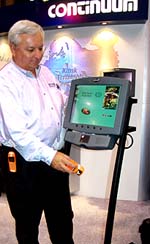 |
Joe Zvanut of Continuum scans an item using the CS-4000's built-in bar code scanner. |
Using the application, attendees ordered cups of coffee, latté, cappuccino and other coffee beverages that AccessVia staff delivered to Continuum's booth.
Joe Zvanut, Continuum's sales and marketing director, joked that AccessVia had stopped delivering coffee because Continuum staff had ordered too much.
The CS-4000 kiosks, Continuum's top-of-the-line model, use an embedded NT operating system and Internet Explorer Web browser. The hardware is powered by either a Pentium II 266 MHz chip or an Athlon running at 500 MHz. Fifteen-inch touchscreens use either Elo Touchsystems or Dynascan models.
One unique feature of the kiosk is a set of five programmable function keys. The machines also contain an optional glide pad, bar code scanner, integrated stereo speakers, and integrated magnetic stripe reader. The small-sized, functional and attractive machines range in price from $5,400 to $7,500 each, and can be mounted a variety of ways. They can also connect to networks using Ethernet, serial connections, or 802.11b wireless.
Other Continuum models are the CS-3000, which is based on Linux and costs between $3,500 and $5,500, and CS-1000 Microkiosks, priced between $1,400 and $1,900.
At the AccessVia Bean Beluga coffee shop, Gaylene Meyer, marketing director,
 |
AccessVia's kiosks deliver your coffee, using its application designed using AccessVia Kiosk. |
AccessVia Kiosk obtains data from a customer's POS system and can integrate with other systems such as customer relationship management. The company will also sell its project design and database programming expertise along with the software, Meyer said.
Eric Bedell, director of sales, explained the pricing system, which is based on a per server or per kiosk rate. Base price for AccessVia Kiosk is $8,000 per server, up to five processors, or $500-$1,000 per kiosk. A small store installation, including project fees, might run $80,000, Bedell said. Larger enterprises would receive discounts.
Ticket machines and loyalty apps
Radiant Systems displayed its Beacon kiosks. Radiant's kiosks are used in Lowes, Regal,
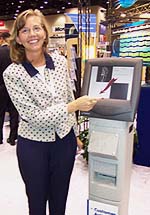 |
At Radiant, Tammy Bailey shows the Beacon kiosk. |
Robert Gallner, vice president of sales and marketing for Cybertotems, stood surrounded by five Cybertotem kiosks, representing information, casino loyalty programs, and other applications the company has developed. Gallner said that in retail, kiosk deployments are a lot slower than other types of retail technology deployments, and that the slower-than-expected turnout on the exhibit floor may be due to the cyclical nature of the retail industry.
Among the featured Cybertotems applications was a kiosk able to dispense gift cards.
Also exhibiting were The Netplex Group Inc. and Wincor Nixdorf. Netplex showed a new customer-based cosmetics application called Kioskmetics. Netplex makes the Baby Gift Registry, used by Macy's department stores. Wincor Nixdorf introduced a new wall-mounted kiosk, called the BEETLE, intended as a POI device for customers. The company also displayed its many retail POS terminals and products.
Holo-cow, Batman!
One company to keep an eye on, or both eyes, is Provision Entertainment Inc. Provision's Holovision display projected a three-dimensional image that hovered in space in front of the screen. It resembled a hologram, but wasn't. The Holovision display, which showed a large gold watch rotating slowly, appeared real. It was wow-technology -- the stuff of science fiction that may arrive soon and have applications anywhere screens are used.
The handful of kiosk application and hardware makers at Retail Systems was a foot in the door of the retail industry. By demonstrating applications that work with many facets of retail, from the consumer to the back end databases, the companies showed the industry that kiosks have solutions to retail problems.
[Editor's note: Info Touch Technologies became Tio Networks in April 2006.]
 ChatGPT
ChatGPT Grok
Grok Perplexity
Perplexity Claude
Claude
